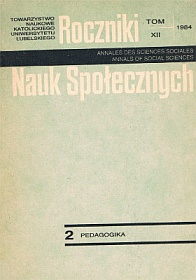Psychological Determinants of Pedagogy Students’ Abilities of Effective Educational Intervention
Abstract
The paper discusses personality determinants of effective educational intervention. Two hypotheses were verified: one, on the relationship between general social maturity and abilities to lead an effective educational activity; the other, on the extent to which rogerian helping relationship conditions form a psychological basis to educational intervention. 144 women students from the universities in Olsztyn and Lublin were tested. From among these, two groups of 30 women each were selected: group A — women of high educational abilities, group B — women of low educational abilities. The technique of „renging in pairs“ was applied for the selection. The groups were tested by CPI, KBE scales (which measure the intensity of congruence, unconditionally positive attitude and empathy). KBE was prepared for the present study.
The results confirmed the author’s hypotheses: to the high potential of abilities of effective educational intervention there correspond high results (over 5,5 sten) in eleven scales CPI of H. G. Hough’s (Do, Cs, Sp, Sa, To, Cm, Ai, Je, Py, Fx, Fe). The most important are ambition, sense of one’s own value, tolerance, typicality, independent thinking, intellectual efficiency, psychological insight, femininity, responsibility and domination.
Highest correlations prevailed between the sense of one's own value and congruence (Sa: K; p 0,01), tolerance and unconditionally positive attitude (To: B; p 0.01), as well as between femininity and empathy (p 0.01).
The results allow author to draw the conclusion that at the foundations of effective educational intervention there lies general social maturity and psychological regularities of an helping relationship.
Copyright (c) 1984 Roczniki Nauk Społecznych

This work is licensed under a Creative Commons Attribution-NonCommercial-NoDerivatives 4.0 International License.


